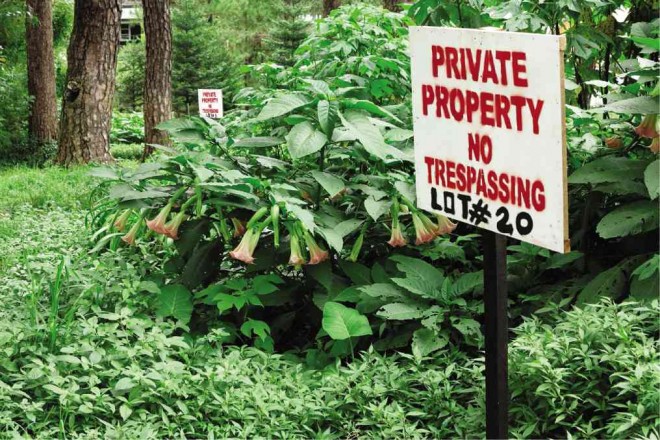
An Ibaloi family puts up signboards around Wright Park (which is popular to horseback-riding tourists) and near lands controlled by the presidential mansion after the Court of Appeals validated in April 2013 an ancestral land title awarded by the government. EV ESPIRITU/INQUIRER NORTHERN LUZON
BAGUIO CITY, Philippines—The National Commission on Indigenous Peoples (NCIP) has nullified ancestral land titles that cover two Baguio parks, the city’s oldest hotel and a part of the reservation of the presidential mansion, an NCIP official said on Sunday.
Government auditors discovered that documents that authenticate the certificates of ancestral land title (CALT) of Ibaloi families were missing, and that the NCIP declared these documents lost, thus invalidating the titles, said former NCIP chair Zenaida Hamada-Pawid, who serves as commissioner for the Cordillera region.
The heirs of Josephine Abanag and Mercedes Tabon, Cosen Piraso and Lauro Carantes, who were granted the voided CALT, held a news conference last week to declare that they lost the privilege to own the ancestral land.
But one of their lawyers, Alfonso Aroco, said the CALT were nullified due to a technicality. He said the NCIP must explain the disappearance of these documents.
These CALT were subjects of nullification proceedings filed by the Baguio City government because the titles cover Wright Park and Forbes Park, as well as the Cordillera House in front of the Mansion, and the city’s oldest hotel, Casa Vallejo, which is administered by a government corporation.
These CALT were registered as private titles by the Land Registration Authority before the government froze all actions on ancestral land applications due to controversies hounding Baguio lands.
When asked, Aroco and lawyer Manuel Cuilan confirmed that the nullification may affect the sale of portions of their clients’ CALT properties.
One of the supposed buyers had issued eviction notices to People’s Television Network, which is building a regional network facility at the Cordillera House compound.
Aroco said his clients obtained last week a certified copy of the NCIP’s Oct. 8 en banc resolution, which canceled the ancestral land title forms of their CALT after confirming that these documents were not at the ancestral domain office and are now considered lost.
The title forms authenticate the ancestral land titles granted to indigenous Filipinos.
The title forms are described by the NCIP resolution as “accountable documents purchased from the Central Bank of the Philippines with corresponding serial numbers and are used as CALT and CADT (certificates of ancestral domain title).”
The resolution also directed the agency to investigate how the documents disappeared and to provide the commission its recommendations as to whether the NCIP needed to review other Baguio CALT.
The resolution was signed by NCIP chair Leonor Oralde-Quintayo and six commissioners, including Pawid.
Aroco said the resolution violated his clients’ rights to property, as provided for by Republic Act No. 8371 (Indigenous Peoples’ Rights Act of 1997 or Ipra).
He said the manner by which his clients’ property rights were being voided was questionable, noting that the missing documents were under NCIP custody.
The absence of these documents was discovered by the Commission on Audit, the NCIP resolution said, and “any transaction in relation to these forms are without basis as these documents were not officially released.”
The NCIP also requires CALT and CADT beneficiaries to secure the permission of the commission en banc when they sell their ancestral lands, said lawyer Severino Lumiqued, NCIP Cordillera legal officer when he addressed the Nov. 18 session of the Cordillera Regional Law Enforcement Coordinating Council.–Vincent Cabreza, Inquirer Northern Luzon